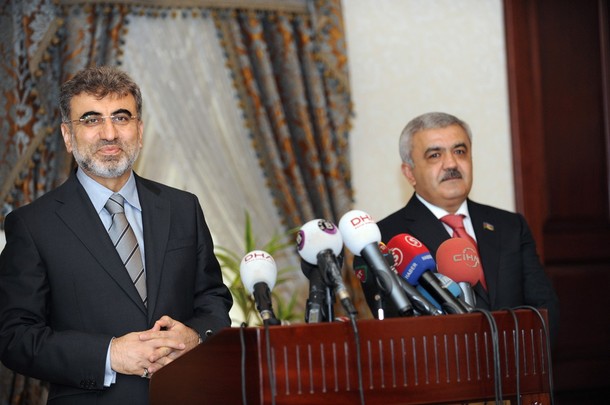
Progress in Turkish-Azeri Talks on Gas Prices and Transit
Publication: Eurasia Daily Monitor Volume: 6 Issue: 153
By:

Following the signing of energy cooperation agreements between Turkey and Russia, Turkish Energy Minister Taner Yildiz continued his "energy diplomacy," by visiting Azerbaijan. Prior to departing for the Nakhchivan Autonomous Republic, the Azerbaijani enclave between Turkey and Armenia, on August 8 Yildiz stressed that his trip followed the agreements Turkey recently signed on both the Nabucco project and South Stream. He also added that as part of intensive energy diplomacy, he will travel to Syria this week to sign an agreement for the construction of a pipeline that will connect the Arab gas pipeline with the Turkish grid (Anadolu Ajansi, August 8).
In Nakhchivan, Yildiz met with the President of Nakhchivan Vasif Talibov and the head of the Azerbaijani oil company SOCAR, Rovnag Abdullayev. Turkey and Nakhchivan signed a memorandum of understanding on laying a pipeline from the East Anatolian city of Igdir to Nakhchivan, which will carry half a billion cubic meters (bcm) of Azeri gas annually to Nakhchivan (Cihan, August 8).
Another major part of Yildiz’s agenda were talks between Turkey and Azerbaijan concerning the gas trade and transportation. Although the negotiations have been under way for some time, Ankara and Baku have been unable to reach an agreement on three inter-related issues: re-pricing the gas Turkey imports from Azerbaijan’s Shah Deniz I reserves, setting the price and volume for Turkey’s imports from the Shah Deniz II, and developing a regime for the transit of the gas through the Turkish territory (www.cnnturk.com, August 8).
These issues have implications beyond bilateral relations between Ankara and Baku. In the context of the discussions concerning the construction of alternative pipelines carrying Caspian basin gas to European markets, there is growing interest in tapping into Azerbaijan’s resources, particularly the Shah Deniz II field, which is expected to be operational by 2016. Whereas the European companies are interested in purchasing Azeri gas to feed Nabucco, Russia has been trying to lock in the same resources through a long-term contract to supply its alternative South Stream project and to pre-empt Nabucco. Baku is looking to secure the best deal from this competition, and diversify its export routes as much as possible, which led it to export a symbolic volume of gas to Russia through a non-binding agreement in June, which seems to have paid some tactical dividends (EDM, July 17).
Azerbaijan’s decision is considered as a "flexible tactical move" on Baku’s part (EDM, July 2). The agreement demonstrated to Ankara and its Nabucco partners that Azerbaijan was not short of options for the sale and transport of its gas. Indeed, the urgency induced by the agreement served as a wake-up call for Turkey and other European countries, which helped convince Ankara to end its stalling and open the way to sign the Nabucco inter-governmental agreement (EDM, July 6).
Nonetheless, a second tactical goal of the Azeri-Russian agreement has yet to bear concrete results: "the $350 price offer [which Russia will pay for the Azeri gas] has set a benchmark that other importers of Azerbaijani gas may have to bid against" (EDM, July 2). Indeed, Baku’s sudden move surprised many in Ankara at the time, leading to speculation that Turkey might have to pay higher prices. Nonetheless, when asked about the impact of the Azeri-Russian deal on the Turkish-Azeri talks on re-pricing, Yildiz preferred to decouple the two processes from each other. "How much does the [Azeri-Russian agreement] affect the price? This question should be directed to Abdullayev. We had submitted our offer before the agreement with Russia, and we are still at the same position. Because, [we believe] our price offer takes into account both sides’ interests, and ensures that the project remains feasible" (www.haberturk.com, July 10).
Ankara claimed that it offered a "fair" price to Baku, and it expected this to be accepted (EDM, June 4). Apparently Turkey proved unable to satisfy the expectations of the Azeri side, and Yildiz and Abdullayev have held several meetings to discuss this issue. Ankara’s reluctance to revise the price for Azeri gas raises suspicions that, using its geographic position as leverage, Ankara is resorting to "tactics of extortion" to maximize its benefits at Azerbaijan’s expense, which might eventually undermine the prospects for Nabucco (EDM, July 2).
Nonetheless, Azerbaijan’s ongoing talks with Turkey demonstrate its willingness to export its gas to European markets independent of Russian-controlled pipelines and its treatment of Nabucco as an overriding national interest. However, the conditions that Ankara will attach to the use of its territory for exports, including transit fees and re-export rights, are a major factor influencing Baku’s decision, which raises a larger question about the Turkish government’s position on pipeline diplomacy.
After signing agreements on both Nabucco and South Stream, Ankara maintains that the two projects are not necessarily exclusive. Moreover, in response to charges that Turkey’s agreement with Russia, which granted South Stream the right to conduct seismic feasibility studies in the Turkish zone of the Black Sea, was a serious blow to Nabucco, Turkish officials maintain that "Turkey is not a partner in the South Stream project and only allowed the use of its territorial waters in the Black Sea, while the country is a partner state in Nabucco." They also added that Turkey still considers Nabucco as a strategic priority (Hurriyet Daily News, August 7).
If Turkey indeed treats Nabucco as a priority project, one area where it could tilt the balance in favor of Nabucco is to facilitate the westward flow of Azeri gas. In this way, it could cement its ties to Baku and reassure its Western partners of its commitment to Nabucco. No agreement was signed during Yildiz’s meeting, but the statements by Azeri officials signaled a promising future. Abdullayev said that, "we came close to concluding Turkey-Azerbaijan gas agreements. We can soon finalize the issue of transit prices. Gas from Shah Deniz will also come to Turkey, and will flow to Europe through Turkey. This will support the two sister nations" (www.ntvturk.com, August 8).




